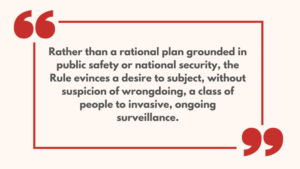 On October 13, the Harvard Immigration and Refugee Clinic (“HIRC”) submitted a public comment drafted by the Cyberlaw Clinic regarding a rule proposed by the Department of Homeland Security (“DHS”) and U.S. Citizenship and Immigration Services (“USCIS”). The proposed rule would greatly expand DHS and USCIS’s authority to collect biometric data from immigrants, foreign nationals, permanent residents, and citizens involved in the immigration process by making biometric collection mandatory rather than discretionary. It would also expand the types of biometrics to include palm prints, iris scans, and voice prints. Finally, it would remove current biometric exemptions for minors under age fourteen and weaken protections for asylum seekers under the Violence Against Women Act.
On October 13, the Harvard Immigration and Refugee Clinic (“HIRC”) submitted a public comment drafted by the Cyberlaw Clinic regarding a rule proposed by the Department of Homeland Security (“DHS”) and U.S. Citizenship and Immigration Services (“USCIS”). The proposed rule would greatly expand DHS and USCIS’s authority to collect biometric data from immigrants, foreign nationals, permanent residents, and citizens involved in the immigration process by making biometric collection mandatory rather than discretionary. It would also expand the types of biometrics to include palm prints, iris scans, and voice prints. Finally, it would remove current biometric exemptions for minors under age fourteen and weaken protections for asylum seekers under the Violence Against Women Act.
The comment highlights four problems with the proposed rule. First, DHS and USCIS have not provided sufficient justification for expanding their already significant discretionary biometric collection powers. Second, the resulting database of biometric information would be ripe for abuse by state and federal law enforcement agencies. Third, many of the biometric technologies enabled under the new rule are invasive and unreliable. Fourth, the rule raises serious constitutional concerns under the Fourth and Fifth Amendments.
Fall 2020 Cyberlaw Clinic students Sasha Peters and Sankalp Gowda worked with Clinical Instructor Mason Kortz and with HIRC to draft the comment.
